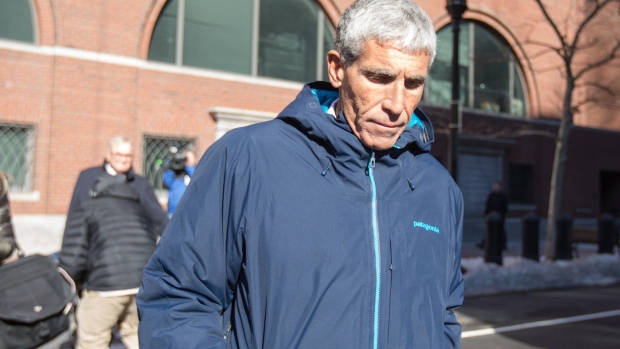Mar 15, 2019
For Mastermind of Vast College Scam, Fat Fees Weren’t Enough
, Bloomberg News

(Bloomberg) -- To nervous parents looking for an edge in the college-admissions process, it’s a familiar pitch.
Game the system. Everybody else does.
And indeed, William Rick Singer appears to have run a regular admissions-consulting business for a time, not unlike countless others in that wildly lucrative industry.
But the same cutthroat competition and parental anxieties that drive affluent Americans to hire tutors, editors, strategists and other experts helped Singer build an even more profitable business, which federal prosecutors described in a massive set of criminal charges unsealed Tuesday.
In that operation, wealthy parents -- including celebrities, a top mergers attorney and a venture-capital CEO -- paid Singer to get their kids into elite colleges using cash to pay off surrogate test takers and bribes so college coaches would designate applicants as athletic recruits, according to the charges. Parents paid a total of $25 million from 2011 to 2018, the government claims, to get their children a lock on a top school and the lifelong advantages that can flow from it. Singer claimed he engineered almost 800 bribes to coaches.
Singer, 58, pleaded guilty Tuesday to racketeering, money laundering, fraud and obstruction of justice. He started cooperating with authorities in September, after he was caught, and helped make cases against others. At a hearing in Boston, he also told U.S. District Judge Rya Zobel he had tipped off some families that he was wearing a listening device, warning them not to say anything incriminating.
More: Parents and Coaches Charged in Vast College-Admissions Plot
“The striking thing to me is, once you get a group of people who are willing to lie as a group, there’s tremendous power in that, because the systems are not built to withstand attacks based on coordinated lies,” said Chris Falcinelli, founder of Focus Educational Services, a private tutoring firm in Brooklyn that also provides college counseling. “That’s what this was.”
Prosecutors called Singer the “mastermind” behind the plot, which appears to be the largest college admissions scam ever, leading to the arrest of dozens of parents, coaches and test administrators. Under his plea agreement, he faces a prison term and will forfeit more than $3.4 million. Sentencing is set for June 19.
Donald Heller, a lawyer for Singer, didn’t immediately respond to an email and phone message seeking comment.
Among college counselors in California, Singer was known as a “world-class braggart,” said Jon Reider, who retired last year as the director of college counseling at San Francisco University High School and is a former senior admissions officer at Stanford, one of the colleges where coaches or former coaches were implicated in the plot. None of the schools or students were charged.
More: ‘Home Run of Home Runs’: How to Bribe Your Kid Into College
The author of a 2014 book called “Getting In,” Singer said in a 2017 podcast that he used to work for a college and had learned insider tips that even high school guidance counselors didn’t know. He said he worked with 8,300 seniors that year, “walking into everyone’s home” and “taking over the process.” He offered a premium, personalized service at $7,000 a year and a tech-based option for $250 to $2,000, he said, and had “hundreds and hundreds” of employees.
In 2010, he pitched a television network on a reality show about college admissions, describing wealthy families torn apart by “out-of-control” parents pushing their kids into elite colleges and learning that even donating millions of dollars doesn’t guarantee admission.
“This is a game. Just realize this is a game,” he said in an audition tape obtained by TMZ.
More: College Arms Race Goes Too Far With Wealthy ‘Gaming the System’
At the center of the scheme was Edge College & Career Network LLC, Singer’s Newport Beach, California, consultancy. An alleged accomplice, Florida resident Mark Riddell, would take the ACT or SAT college admissions test in place of clients’ children. The parents paid Singer $15,000 to $75,000 a test, structuring the payments as donations to a charity called Key Worldwide Foundation that was affiliated with Edge, according to prosecutors. The test scores were sent to Boston College and Boston University, among others.
“The kid still had to write their own essay, in their own handwriting,” a thin, graying Singer said in court. “That was the only legitimate part of the test they did.”
Students took their exams at specific testing centers where Singer had used the bogus charitable donations to bribe the proctors -- after the kids faked learning disabilities, at their parents’ instruction, to end up at those centers, authorities said.
Singer won over skeptical parents by telling them he had used the same setup many times before, according to court documents.
More: In College Scams With a Twist, Rich Parents Use Sports ‘Side Door’
“They’re all families like yours,” he told Gordon Caplan of Greenwich, Connecticut, co-chairman, on leave, of the law firm Willkie Farr & Gallagher in New York, according to the papers.
In many cases, they referred other parents to Singer. In one instance cited in the documents, he was introduced to the family of a Yale applicant through a Los Angeles financial adviser. An employee of the adviser emailed Singer to say the father wanted to make a “donation” for his daughter’s “application.”
The scheme didn’t rest only on a stratospheric entrance-exam score. At Singer’s urging, parents spent lavishly on bribes for coaches at schools like Yale, Stanford, USC, UCLA, the University of Texas and Wake Forest, according to a Federal Bureau of Investigation affidavit. A former Georgetown tennis coach, Gordon Ernst, got $2.7 million, according to prosecutors. Singer even helped construct phony athletic profiles for his applicants.
“The child would not know, but the family would know,” he explained to the judge.
Singer’s company, also known as the Key, describes itself as “the world’s largest private life coaching and college counseling company,” located in 81 cities in the U.S. and five other countries. It offers “one-on-one support for students to help them design and ultimately realize a life plan” and reaches “the world’s most respected families,” according to its website, which for an academic enterprise has its share of dropped punctuation and erratic style choices.
The “CEO and Master Coach” worked in another industry that touches many Americans’ lives. According to the site, Singer ran retail call centers for The Money Store and West Corp. and was hired by WestBridge Capital, a venture capital fund in India, to head up FirstRing, a company with an 800-employee call center in Bangalore that was sold to ICICI Bank in 2003.
West Corp. and WestBridge Capital didn’t immediately respond to emails seeking comment. The Money Store’s parent company didn’t respond right away to voicemail messages.
More: Parents in College Admissions Scandal May See Steep Tax Fines
The website claims that “a new Key vertical” was recently started with financial services companies including Morgan Stanley, UBS Group AG, Oppenheimer & Co. and Pimco “to advantage the Key life coaching model for both private wealth management clients and employees.”
A representative of Morgan Stanley said the bank’s relationship with the Key ended in 2013, declining to comment on its nature. UBS said only that it doesn’t currently have an association with the company. Oppenheimer said it had “a very limited relationship with Key Worldwide Foundation, which it subsequently severed.”
“Pimco has never had a business relationship with Rick Singer or his college preparation organization,’’ the company said in a statement. “Neither Pimco nor the Pimco Foundation has ever paid Mr. Singer or donated money to his foundation.’’ It added that it invited Singer to speak about college admissions twice in the past decade and that some of its employees have used his legitimate college prep services.
Former Pimco CEO Douglas Hodge is among those charged in the case. The company said it isn’t aware of any current employees who have acted improperly.
Key Worldwide Foundation took in just over $7 million from 2013 to 2016, the most recent year for which data are available, according to public filings. It was set up in 2014 to “provide guidance, encouragement and opportunity to disadvantaged students around the world,” according to its website, which says it pays for 30 students a year to “attend the Key’s Premium College Coaching program.”
It paid out $1.34 million to Ernst, the former Georgetown coach, for “consulting.”
Ernst couldn’t be reached for comment.
Singer was fired in 1988 as boys basketball coach at Sacramento’s Encina High School, the Sacramento Bee reported, citing a district spokesman. Raj Rai, communication coordinator for the city’s San Juan Unified School District, said Singer’s temporary employment ended in 1988 after a single school year, and she said records don’t say why his contract wasn’t renewed.
Singer was a familiar presence on the area’s college-prep circuit, according to the article, and worked as a “midlevel manager” at the Money Store in the 1990s before opening a college consultancy in that city called Future Stars. (MLD Mortgage Inc., which does business as The Money Store, is separate from the firm that employed Singer.)
A former coaching colleague told the paper, “I remember him as a workaholic. He never did anything halfway.”
(Updates Pimco response under last blue "More" article link.)
--With assistance from Janet Lorin, Erik Larson, Patricia Hurtado and Suzanne Woolley.
To contact the reporters on this story: Janelle Lawrence in Boston at jlawrence62@bloomberg.net;Bob Van Voris in federal court in Manhattan at rvanvoris@bloomberg.net;Christopher Palmeri in Los Angeles at cpalmeri1@bloomberg.net
To contact the editors responsible for this story: David Glovin at dglovin@bloomberg.net, Peter Jeffrey
©2019 Bloomberg L.P.
























